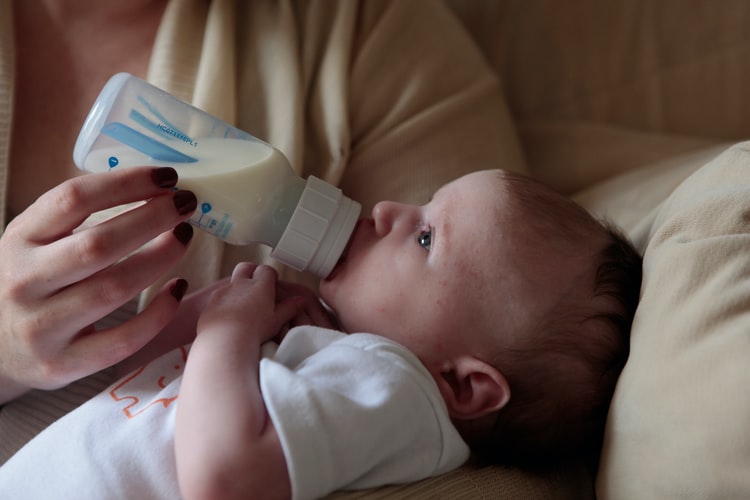Written by Chasse, B. M. (2020, April 10). Breastfeeding vs. Formula: Learning what works for you and your baby. Originally Published by GoodTherapy.
As a psychotherapist with extensive training in child development, I have a great appreciation for the unique developmental needs of our littlest humans. Much research has shown that breast milk is superior to formula—and yet, the breast isn’t always best!
For expecting mothers, the pressure to exclusively breastfeed is enormous! I’d like to say this stigma is simply the result of private citizens who think they are being supportive of other moms. However, this stigma can extend far beyond private citizens and even into the medical field.
As advanced as the medical field is, it is still not uncommon for obstetricians, pediatricians, and (sadly) even mental health professionals to push the agenda that the “breast is best” on their patients. One factor contributing to this issue is that many professionals are simply uneducated on breastfeeding and the many challenges that can impact or impair this process.
Sure, the gold standard often continues to be exclusive breastfeeding—but what does this mean for new moms who may simply be unable (for any number of reasons) to achieve this standard? Are children who receive formula suddenly inferior to their breastfed peers? Is a mom unable to breastfeed her baby an inferior parent, disregarding the best interest of her child, or somehow less of a woman? Absolutely not!
BREASTFEEDING ISN’T ALWAYS ‘BEST’
The common belief that breastfeeding is natural and every woman is inherently capable of doing it is setting many up to feel inferior during a time when they may already be incredibly vulnerable. Additionally, it creates a dichotomy where the assumption becomes: if breastfeeding is natural, then bottle feeding is unnatural. There is an assumption that simply because our bodies have the capacity to produce milk, that we should immediately and instinctively know how to breastfeed our newborns.
The reality is that breastfeeding is incredibly hard! It can be exhausting and physically demanding on our bodies. It does not happen without support and a significant learning curve—and it does not happen for everyone.
Breastfeeding is a very personal choice—and is not the best choice for every new mom, every child, nor every family. The challenges of breastfeeding can be incredibly stressful, and that can impede the process further. Some newborns have a very difficult time tolerating breast milk, and some struggle to get enough milk to hold them before falling asleep, causing serious impairment in the sleep of both child and mother. Additionally, challenges in nursing can cause significant distress for a new mom, which can impact the bonding that is assumed to naturally occur during this time.
Stress causes cortisol (stress hormone) levels to increase, and this is transferred to a child through breast milk. So, the right question isn’t whether the breast is best. Instead, it’s important for every new mom to ask themselves, “is breastfeeding right for me and for my baby?” If, for any reason, breastfeeding is causing a high level of stress, then the bottle may simply be a better fit—and choosing to bottle feed is not a statement to your commitment or fitness as a parent.
Surround yourself with those who support and empower you to make decisions based on what is best for you and your baby. After all, you are the expert on your child!
Give yourself permission to choose an alternative without feeling inferior. An inability to successfully breastfeed is not a failure. And above all else, be gentle with yourself! Your child does not need their mom to be perfect. Instead, they need to know they can influence their environment to get their needs met, and they need to experience you as a soft place to fall. How you show up for your child over time will impact your child far more than your decision or ability to breastfeed.
The mental health and wellness of any mom is an important priority. Bottle, breast—it’s all irrelevant if you aren’t in the best emotional space to care for your child. Your relationship with your child is most important—and those relational goals can be achieved with either a bottle or the breast, so do what makes the most sense for you.
References:
- Nolvi, S., Uusitupa, H. M., Bridgett, D. J., Pesonen, H., Aatsinki, A. K., Kataja, E. L., Korja, R., Karlsson, H., & Karlsson, L. (2017). Human milk cortisol concentration predicts experimentally induced infant fear reactivity: Moderation by infant sex. Developmental Science, 21(4). doi: 10.1111/desc.12625
- Stuebe, A. (2009). The risks of not breastfeeding for mothers and infants. Reviews in Obstetrics & Gynecology, 2(4), 222-231. Retrieved from https://www.ncbi.nlm.nih.gov/pmc/articles/PMC2812877

